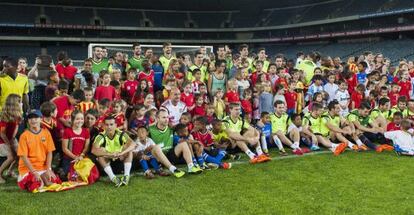A stain on Spanish soccer
The Federation’s silence over Guinea trip has left La Roja out in the cold

A 16,300-kilometer journey, three nights in an airplane, a match in Malabo that won’t be rewound too many times, a useless test for Vicente del Bosque and Xabi Alonso almost scythed in half. If this was already a heavy price for a world champion, it is still more damaging that the Spanish national team has been dragged through the mud by the silence of Spanish Football Federation (RFEF) president, Ángel María Villar, after he became enraged by requests for explanations about the stopover in Equatorial Guinea. A stain has spread over the team that the collective does not merit. During its years of recent glory, La Roja has served as an example of teamwork: a brand, a model, even when external influences have attempted to cause divisions.
The national team’s most controversial trip has obeyed the diktats of the RFEF’s own federative class. The Malabo expedition was a botched job from start to finish, and it will leave an echo. At the very least, it required Villar to make public his pretexts: he has overseen the most successful period in the history of Spanish soccer and he has his merits, but that should not serve as an excuse to feel that the national side is private property to be subjugated to his designs.
Villar could have made any appeal that the trip to Equatorial Guinea was purely designed as a gesture, a fleeting party, a breath of fresh air. It is not easy to distance sport from tyrants, and at the same time try to bring sport closer to the victims of oppression. Villar is the guardian of the values that Spanish soccer has brought to the field of play and in its conduct off it. Because of this, and in this instance more than ever, the man responsible for the trip to Malabo should at least attempt to justify his decision. By not doing so, he leaves his players and staff exposed to the elements. As Del Bosque said before the expedition left Madrid, all questions on Equatorial Guinea “should be asked at the next window along.” It is the custom in Spain: silence as a response, the new national sport.
It is not easy to distance sport from tyrants, and bring it closer to the victims
On this occasion, the case has nothing to do with an arbitrary whim of Fifa and its hierarchy. Neither is it sufficient to invoke the hyper-professionalism of soccer and its powerful marketing machine. In this instance, there are no sporting matters in between. If the match was a focal point of conflict before it was played, given what unfolded, a training session at La Roja’s Valdebebas complex would have been of more use, even for Marc Bartra, who made his debut for Spain in Malabo. In front of home fans, it is more difficult to be inhibited.
In Malabo, there was little recourse open to Spain’s players other than to watch as — with the complicity of the referee and Andoni Goicoetxea, the Equatorial Guinea coach — Thierry Fidjeu took a hacksaw to Iñigo Martínez, Alberto Moreno and Xabi Alonso. It took Goicoetxea an hour to substitute the local bone-crusher, in mercy to the visiting side that contributed to his international coaching career taking off — he served as coach to Spain’s junior sides and as assistant to Javier Clemente at the 1994 World Cup. The Spanish expedition had asked that the pitch be in perfect condition for the game; this request met, the armistice was shelved. Instead of watching his side capitulate, Goico preferred to risk Fidjeu’s expulsion. When he was taken off, Alonso had a melon-sized bruise on his left leg.
If the stopover in Equatorial Guinea was not justified by Villar, the end destination required none whatsoever. Spain did not have sufficient time to thank South Africans for their hospitality during the last World Cup. Villar promised the team would return and those in the current squad who were there on the historic night, July 11, 2010, will be able to bathe in nostalgia at Johannesburg’s Soccer City stadium.
Friendly matches have not been the best lap of honor for the world champion, which went missing against the big names (Argentina, Portugal, Italy and England) and had nothing to gain from matches against Costa Rica, Panama or Qatar. Nothing serious in the sporting sense, on one side or the other. Equatorial Guinea is another matter. There are dangerous liaisons. The ball does not get dirty and Villar has passed the buck on to La Roja.
Tu suscripción se está usando en otro dispositivo
¿Quieres añadir otro usuario a tu suscripción?
Si continúas leyendo en este dispositivo, no se podrá leer en el otro.
FlechaTu suscripción se está usando en otro dispositivo y solo puedes acceder a EL PAÍS desde un dispositivo a la vez.
Si quieres compartir tu cuenta, cambia tu suscripción a la modalidad Premium, así podrás añadir otro usuario. Cada uno accederá con su propia cuenta de email, lo que os permitirá personalizar vuestra experiencia en EL PAÍS.
¿Tienes una suscripción de empresa? Accede aquí para contratar más cuentas.
En el caso de no saber quién está usando tu cuenta, te recomendamos cambiar tu contraseña aquí.
Si decides continuar compartiendo tu cuenta, este mensaje se mostrará en tu dispositivo y en el de la otra persona que está usando tu cuenta de forma indefinida, afectando a tu experiencia de lectura. Puedes consultar aquí los términos y condiciones de la suscripción digital.









































